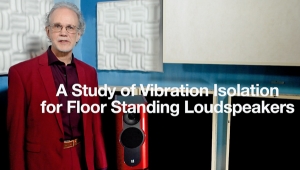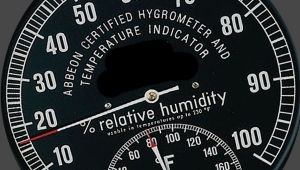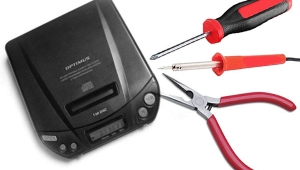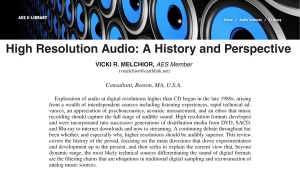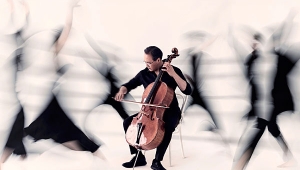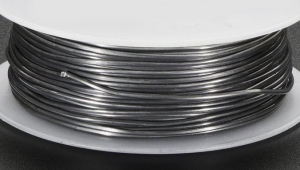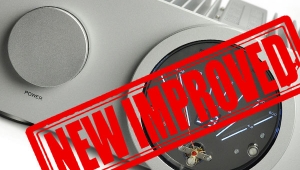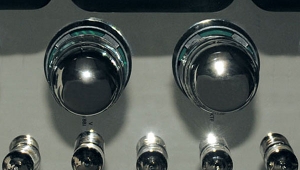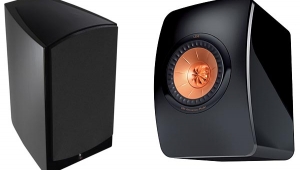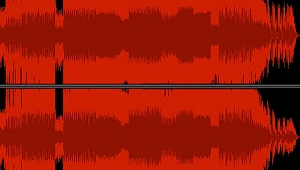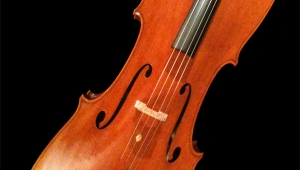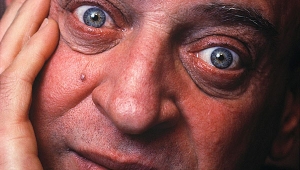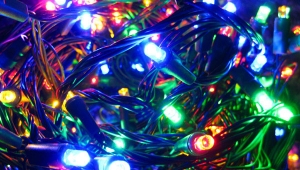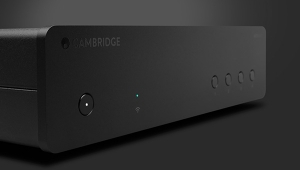| Columns Retired Columns & Blogs |
Audiophilia Nervosa
I was lying on the therapeutic couch.
"And how long have you felt this way about audio components?" my therapist asked. His pen scratched on his notepad.
"Gosh, it seems like forever. My mother told me I would nurse only if she sat down with me next to Dad's old Garrard record changer while it churned through a stack of LPs."
"Hmmmm." He paused, then resumed writing.
"Hey, Doc? Is there anything to drink around here?"
Sometimes I think audiophiles are crazy. If the point of it all is our love of music, we often forget that the brain is where it happens—not in CD players, cables, or speakers. The most dedicated music-lovers—musicians—usually aren't audiophiles. For them, listening to a recording means appreciating the music in their minds and imagination, not as a sound coming from speakers.
I often think of a scene in 32 Short Films about Glenn Gould. The piano prodigy is maybe eight years old. He sits motionless, head in hands, next to an AM table radio as it blares out a slow, graceful symphony. The sound is just awful, the strings distorted into a whine of white noise. But for the young Mr. Gould, that's quite beside the point. When he lifts his head, he's tearful, distraught, and powerfully moved by the music.
Gould reached through the sound into the music, and then through the music into the composer's soul—and he found something powerful. Sonic fidelity (or lack of it) was incidental. He could have listened to that music through a tin-can telephone.
But you won't hear anyone talk like this in an audio salon, or in the audio mags (except, perhaps, for this one). Those magazines are not called The Audiophile's Neurons or The Absolute Auditory Cortex or Neurophile. They're mainly about equipment, and they reinforce our habit of externalizing our auditory pleasures. We believe not only that our favorite recordings will sound better with, say, the latest and greatest amplifier, but also that we'll enjoy them more. Why does the promise of a better musical experience always lead us to listen to other components—to glowing tubes on a shiny chassis, or piano-lacquered speakers? We might as well look inward to see if we can better appreciate and understand the music we already hear in our listening rooms.
Flipping through a recent issue of The Abso!ute Sound (No.121), I really did feel as if I was in psychotherapy. There was a dreamlike quality to what I saw and read, as if I was in one of those surrealistic ads for Calvin Klein perfume. Certain words and pictures seemed highlighted, tinged with drama. They referred to each other and fit together, as if I had stumbled into some interlocking pieces of the audiophile's psychic puzzle.
First came an ad from Cardas, also to be found on p.114 of the January Stereophile, that indulged the new wave in advertising—the product in question isn't even shown. Instead, we see a handful of people standing in the Austrian countryside. They should be gazing at the majestic hillside that looms behind them, but instead their collective gaze is riveted on something off-camera. What's going on? Were they conversing about wine, socialism, or Thomas Mann, when suddenly—"Look! Over there! A vintage Quad electrostat!" There are no answers. They're entranced by something unknown.
A few pages later, I'm staring at an ad for Verity Audio's Parsifal speakers. The camera has zoomed in on a massive, lacquered baffle bathed in warm, mellow light. The copy is just as warm and fuzzy: "From the instant of a whisper, to the explosion of a passion. Between the notes. Time stands still—The experience of a lifetime. Every time." It's a great ad, visually arresting and enticing. Is that light from a cozy fireplace? We don't know, which is exactly the point. We don't learn anything about the speaker from this ad. It's all about you, the viewer: Whatever would make time stand still for you—whispers or passionate explosions—this product will bring it to you.
Such ads feed our sense of wonder and awe. They suggest something transcendent, something that exceeds and surpasses all else. And they nudge us to associate what we long for, however vague and obscure it may be, with their cables, speakers, or amplifiers.
It fits to see this in TAS, given its self-avowed pursuit of "the absolute sound"—the benchmark of you-are-there realism that no audio system will ever meet. But there's more than sound and music appreciation in play here. This quest for sonic ultimacy looks like a quest for something metaphysical or spiritual, too. In a capsule report on Manley's Stingray integrated amplifier, one comment stands out. Because he's listened to the amp only a few times, the reviewer, Aaron Shatzman, writes, "I am still too early in my evaluation process to tell you how closely to my sense of the absolute it is capable of bringing me."
"My sense of the absolute"? Has Gottfried Wilhelm Hegel been resurrected to write component reviews? As the granddaddy of 19th-century metaphysics, Hegel taught that the world isn't merely what we see, hear, and touch. It's constituted and maintained by something beneath all that, something deep, fundamental, and enduring. For some, it's God. For others, it's an impersonal, cosmic, creative force. Whatever it is, it's self-subsistent (by definition), total, and not dependent on anything else for its existence. It's the big, cosmic bottom line. Hegel, too, called it "The Absolute."
Murky as this may seem, we've all been in Hegel's shoes—lost in a late-night dorm-room conversation or consoling a lonely, broken heart. Isn't there some way that everything—life, the universe, the whole shebang—hangs together and makes sense? Yes, says Hegel. But it doesn't make sense to us, finite, imperfect creatures that we are. It transcends us and everything we can know. Who, then, does understand it? The only thing that can understand the Absolute is the Absolute itself.
As my trusty philosophical dictionary puts it, "the Absolute is the All conceived as a timeless, perfect, organic whole of self-thinking Thought." (I should have used that trick when I was failing seventh-grade math. "No, Mrs. Wimmer, I'm not having trouble with base 6 numbers. They make perfect sense—to themselves.")
In a TAS review of the Clearaudio Reference phono cartridge, words again drip with metaphysical meaning. This cartridge is "obscenely priced," Harry Pearson writes, but not without reason. Its sonics were better than his previous reference cartridge "by enough of a margin for me to be reminded that, in audio terms, there's always something better down the track, even if we cannot imagine it." The parallel is complete: As great as your audio system may be, it can never be the ultimate. There will always be something better, and you'll always search for it. And no matter how much insight you may have into the fabric of reality, the Absolute, there will always be more to know.
Well, I thought the parallel was complete. As I read on, I learned that the ultimate component has actually arrived. It's the Nearfield Acoustics PipeDreams loudspeaker, and it gets the highest praise I have ever seen in my audio career. Nearfield's advertisement in the same issue sets the tone: Your eye sits near the bottom of a huge speaker tower with two lines of drivers soaring upward. I count 13 woofers and 28 tweeters before they run off the page into the metaphysical distance. It's your ladder to sonic heaven, to the Absolute.
The PipeDreams is featured three times in the editorial copy of this issue of TAS. Apropos of something transcendent and otherworldly, Jonathan Valin suggests, mere words are incapable of conveying the PipeDreams' glories. "I don't know that I can impress on you strongly enough how wide and deep and tall and open, how subtly detailed and subtly layered and impressively three-dimensional the PipeDreams' soundfield is....We are talking here about a loudspeaker system that breaks down that 'fourth wall' between you and the music-makers. Indeed, the PipeDreams blow out all the walls in your listening room."
Listening to a recording of a church choir, Valin comes face to face not only with the absolute sound of the musical event, but nearer indeed to the absolute Absolute. "Folks, this isn't just a little difference in soundstaging. It is an overwhelming musical and sensory experience—much, I assume, like being in that very church and hearing these singers raise their voices in praise of God."
The superlatives keep coming: the system has "the best subs I've heard"; it's "drivable by anything"; transients are "reproduced with greater life-likeness than you've heard before from a stereo system"; and well-recorded drums will sound "like an actual drum kit set up in your room, moving air with close to the same [lightning] speed, massive acoustical power...and signature directional properties you'd hear in life."
Valin does find some nits to pick with the system. But these seem almost obligatory, given the unprecedented levels of performance he describes. We are now in the epoch known as "P.P.," he says. Ignore the Freudian implication—he means that we're in the "post PipeDreams" era. A new day has dawned in the history of audio.
But has it really? What role will these speakers play in the lives of Jane or John Q. Audiophile? They cost $75,000/pair and probably require a listening room larger than yours and mine combined, not to mention a staff of weightlifters to move them (each tower weighs over 400 lbs). I gather that the manufacturer or your dealer will deliver a pair to you, but what does that matter? As Valin notes, "folks with ordinary digs need not apply for the Nearfield free home trial."
So even though they're real bricks-and-mortar speakers, the PipeDreams are practically as unattainable as Hegel's Absolute. Some of us can make pilgrimages to a dealer or audio show to see and hear them (if not bow and pray to them), but they're not ordinary audio components that we can take home and live with. They remain in the mystical realm of the ultimate, where everything exceeds what we're familiar with, where passions whisper, time stands still, and nothing really makes any sense.
Audiophiles and metaphysical philosophers aren't searching for the same things, but they work from a common assumption. As Hegel and Harry Pearson say, there's always something better, something beyond what we know, that outstrips our words and imaginations. Hegel strained to understand the Absolute, but knew he'd never get there; audiophiles constantly improve their systems in an endless quest for sonic realism. Both have a lot of faith that the next insight or the next bigger and better piece of equipment will bring them closer to the elusive goal.
As for me, I'm waiting for the next generation of speakers to arrive. They'll have even greater virtues than the PipeDreams. I'll be able to afford them, for starters, and they'll fit nicely in my listening room. They'll even improve the performance of my other components, make my life more fulfilling, and bring true love and world peace. The dream loudspeaker has arrived, but I'm still dreaming. I must be incurable.
Back at my shrink's, it had been a big day:
"George, based on our many sessions together, I'm ready to offer my expert diagnosis: You are suffering from the complex known as Audiophilia nervosa."
I sat up on the couch and wheeled around.
"And your point is...? Of course I have Audiophilia nervosa. Six years of therapy and you're telling me the obvious?!? Jeez, Doc. With all the money I've paid you over the years, I might as well have bought the PipeDreams..."
A guilty smile crept across his face.
"It really is a great speaker system," he confessed.
- Log in or register to post comments
